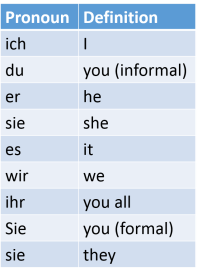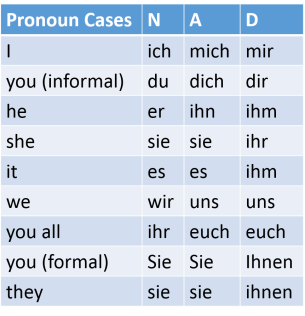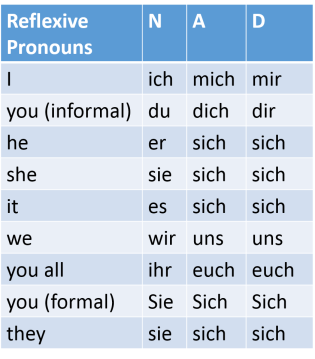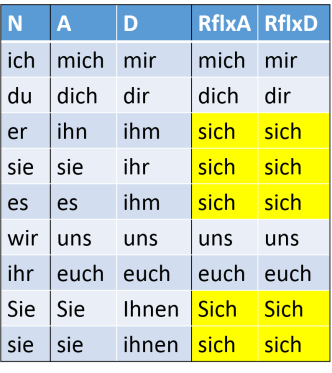Let the gossiping begin! I’m going to teach you how to talk about other people!
Below is a chart with the regular nominative case pronoun paired with its English definition:
There are a few odd things to take notice of on this chart.
1) There are 3 instances in which the proper pronoun is a variation of the word “sie.” Capitalization, conjugation and context will help you in determining which “sie” pronoun is being used. The pronoun for “you (formal)” is always capitalized. It uses the infinitive form of verbs, just like the pronoun “sie” (used to mean “they”), so in writing the capitalization will differentiate the two. In spoken German, context will be the key. Meanwhile, the “sie” (used to mean “she”) takes a different conjugational form of verbs and will be recognizable that way.
2) There are two different German pronouns for the single English word “you.” In German, they differentiate between a formal “you” and an informal “you.” Germans actually have two verbs to describe the use of these specific pronouns: “duzen” and “siezen.” So how do you know when to dutze or sietze? Generally, duzen signals comfort and relationship, whereas siezen signals respect (I like to think of it being akin to the “royal we” used in English); whichever pronoun more accurately depicts the relationship between you and the “you” to whom you wish to refer is the appropriate choice. For example, when addressing a family member or close friend, you would likely refer to them as “du”; when addressing the person conducting your job interview, you would likely refer to them as “Sie.” If you’re ever in doubt, siezen is the safer choice. Many Germans will politely correct you by saying, “Wir dutzen uns” (We call each other “du”)– which is much like if you were to call someone “Dr. Doe” and she responds, “Oh, call me Jane!” I’ve found that it is generally better to show “too much” respect than to not show enough when first engaging with a new person– at the worst you’ll flatter someone.
We have learned that the case and gender of a noun changes its articles and adjectives. When it comes to pronouns, the case still determines which pronoun form to use, but gender is relatively irrelevant. It would be incorrect to say that gender plays no roll in pronoun usage (as we still differentiate between “he”, “she” and “it”)– but instead of having the beloved 4×4 grid based on the noun gender and case, we simply have the pronoun case to consider. Much like in English, one doesn’t say “I love he” or “I love she,”; we would say “I love him” or “I love her.” The pronoun changes to indicate the role of the second person/object/indirect object. However, German has more differentiation than English does (for example, we never change the form of the pronoun “you.”).
Examples:
- Nominative: You love me.
- (Informal) Du liebst mich.
- (Formal) Sie lieben mich.
- Accusative: I love you.
- (Informal) Ich liebe dich.
- (Formal) Ich liebe Sie.
- Dative: I took the paper from you.
- (Informal) Ich habe die Papier von dir genommen.
- (Formal) Ich die Papier von Ihnen genommen.
Now we are going to talk about our “-selves”… all 9 of them! There are many German verbs that require Reflexive pronouns, which are pronouns that translate to things like “myself” “yourself” “himself”…
Examples:
- Accusative: You bathe yourself.
- (Informal) Du duscht dich.
- (Formal) Sie duschen Sich.
- Dative: You comb your hair. [More literally: You comb the hair yourself. –or– You yourself comb the hair.]
- (Informal) Du kämmst dir die Haare.
- (Formal) Sie kämmen Sich die Haare.
Now if we compare the 2 charts that we just learned, we will notice that they are rather similar. I have highlighted the differences in yellow:
Basically, if anything changes at all, it becomes “sich” or “Sich” in the reflexive instance.
That’s all that me, myself and I have for you this time around. Now you’re armed with pronouns of all cases, reflexive pronouns of all cases, and information about duzen and siezen. Go take the German world by storm!




Excellent article, thanks a million!
LikeLike
You are most welcome! Best of luck on your German journey!
LikeLike